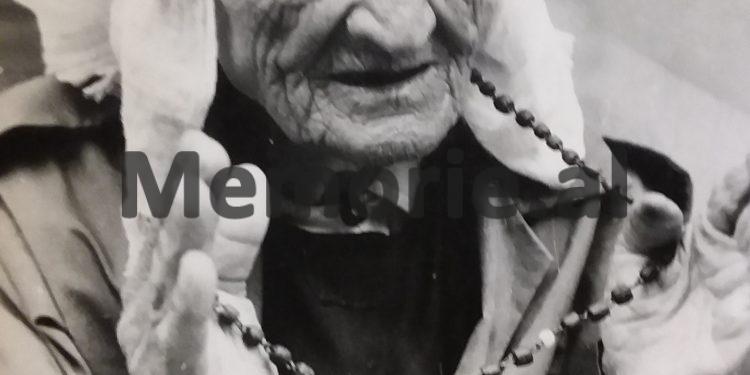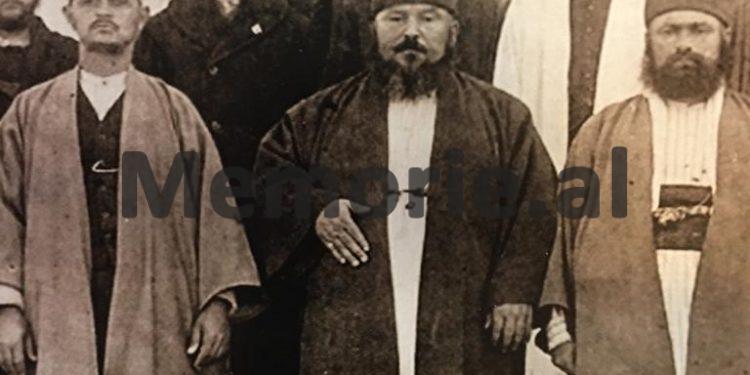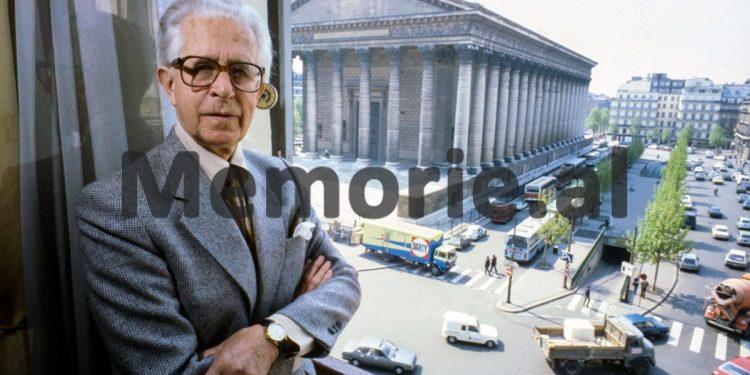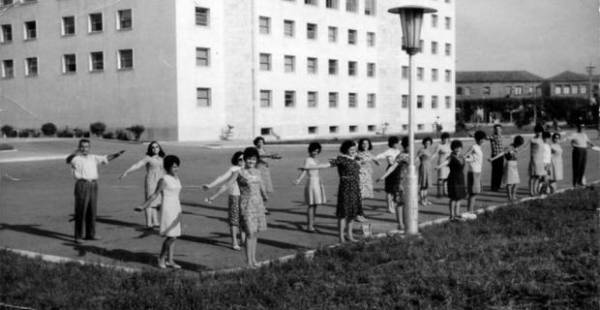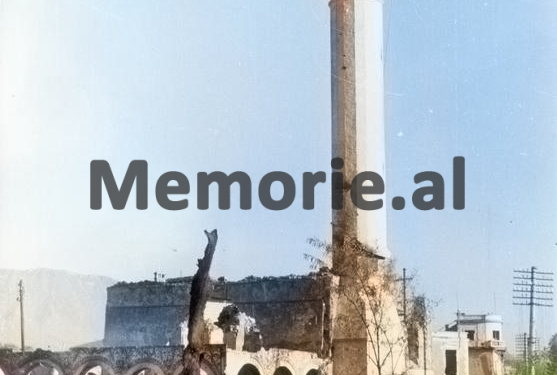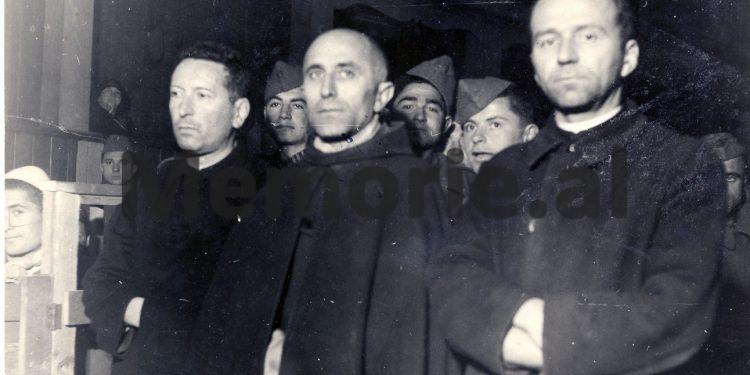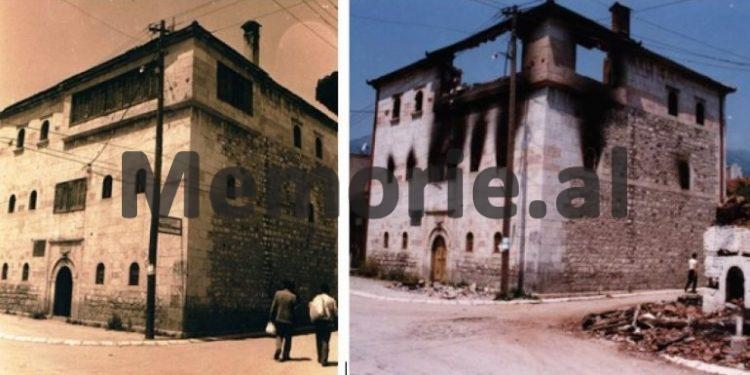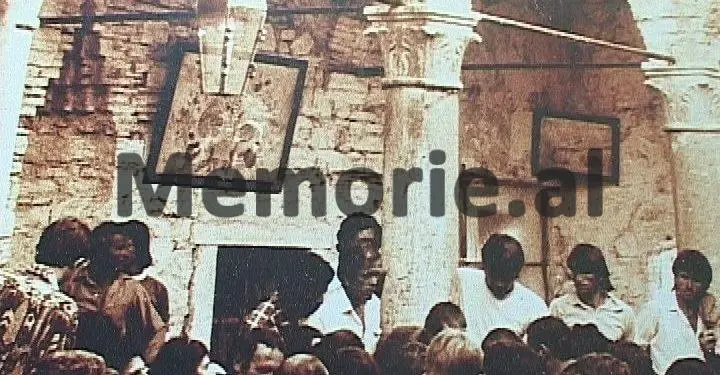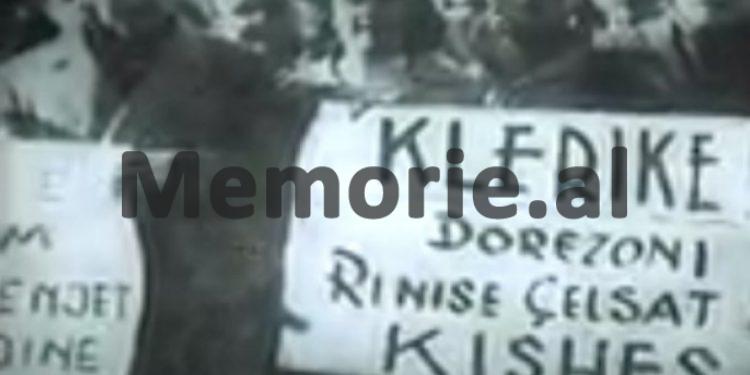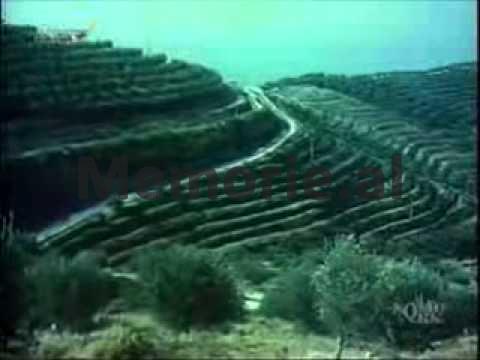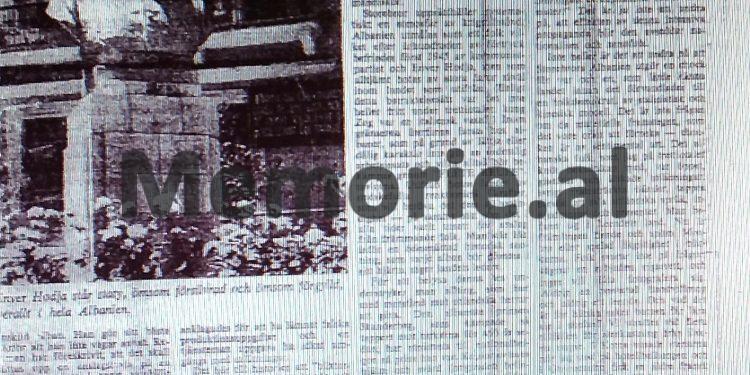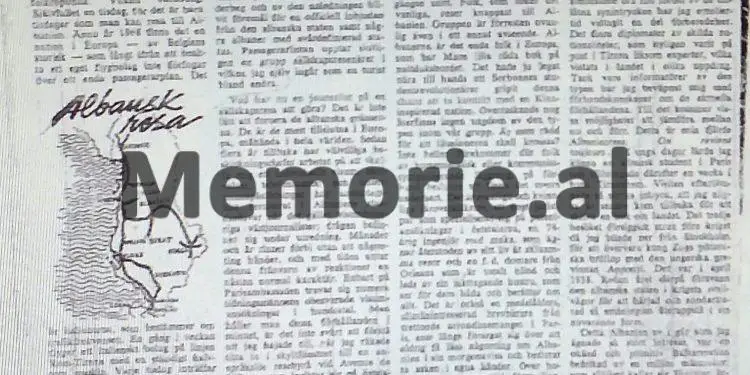Memorie.al publishes a report by the well-known Swedish journalist, Sven Aurén, published in the newspaper “Svenska Dagbladet” of Stockholm regarding his four visits to Albania, starting from 1938 when he came for the wedding of King Zog and for him completed in September 1968 where he last visited Albania. “Enver Hoxha ordered a year ago that: all the practice of religion, in any form, is strictly forbidden. No priest is allowed to go to the funeral and the crosses have been removed from the Christian cemetery. The Bible has been put on the list of books of “In Tirana an orthodox church is used as a dance place, and the altar has been turned into a cafe, the church in Vlora was used as a grocery store, the picturesque mosque of Gjirokastra has been turned into a tailor…”
Continued from the previous issue
Translated by Adil Bicaku, Stockholm
Albania in September 1968
MARXISM AND THE MINARIES
In today’s China, every morning when you look out of the hotel window you witness rare sights, wherever you are in Beijing, Shanghai, Canton or any other city: in the streets and squares, wherever you look, sees people doing gymnastics, making puppet movements as if Mao were pulling the pegs from his Olympus. The Lord of Albania Enver Hoxha will not be weaker. In Tirana, Elbasan, Pogradec or Korça the picture is the same every morning at seven o’clock: necessarily, collective breakfast gymnastics. Like the Chinese, the Albanian should start the morning with his arms up and his knees bent. Keeping oneself in shape is a civic obligation, because the nation needs only the able-bodied and productive. The useless are parasites. This applies not only to humans but also to animals. Here, too, Hoxha followed the example of China and banned dogs. According to the official motive, the existence of the cat is justified because it occupies rats, while the dog does not even benefit its own food. He who does not work …. A year ago, he was ordered by all dog owners to kill their animals. By means of the iron discipline that the dictator exercises in the country, mass extermination has been a total success. I have trampled Albania from north to south and from east to west: no dog barking.
But one finds China in many essential respects than these. In Tirana they followed the cultural revolution with a strong interest. This intelligent Enver understood the political benefits associated with maintaining a permanent revolutionary climate on condition that he could control it. The masses are driven to the height of feelings that together with their leader pursue a relentless fight against bureaucracy, apathy and hesitation. In a small country like Albania with only one and a half million inhabitants, the difficulty is that there are not many populations in the true sense of the word and in addition it suffers a lot from the lack of educated people. With Hoxha as initiator, the so-called direct-democracy debuted a year ago, according to the Chinese model at the capital’s university, where students started taking their teachers to the investigator and blaming them for being backward and lacking in a progressive spirit. Yet the question was never raised to erect any barricades, nor even the occupation of classrooms, as the action was extinguished as quickly as it began. Hoxha realized that the modest number of university teachers did not enable such madness.
For the same reason, it was also not possible to shake state administration officials. But since this Hoxha, he learns, will also not abandon the cultural revolution, which Mao sees necessary to keep the communist doctrine pure, one thing had to be invented. What was easiest, and what he even decided to do, was religion. In the previous article, I told about the unbridled cult of the individual that the dictator organized throughout Albania and how he, only under the name Enver, presents himself as a god for his people. You will have no god but me! It could be the leitmotif for the new cultural revolution, which he ordered almost a year ago and which is directed against anything that has to do with religious beliefs. In Albania, 70% are Muslims, 20% Orthodox and 10% Catholics. What is intended is 100% Enver-worshiper. With this in mind, Muhammad and Christ are described as primitive worshipers of God of the past. Trust in them makes the people remain in reactionary backwardness. A real communist state eradicates these prejudices and it has happened.
What a root. This has been done so radically that even China could not have shown the same result. Albania claims to be the only absolutely atheist country in the world. All the practice of religion, in any form, is strictly forbidden. No priest is allowed to attend the funeral and the crosses have been removed from the Christian cemetery. You can see them here and there in the piles at the base of the walls. The Bible is on the list of forbidden books. Churches have either closed or become “useful.” In Tirana, an Orthodox church is used as a dance floor, and the altar has been turned into a café. I saw in Korça a large church with two bell towers, whose windows were painted brown. The doors were locked. In the church of Fier the windows were also painted, and the doors were closed completely, but apart from that the entrance was turned into an old car iron warehouse. The church in Vlora was used as a grocery store. Our companion, an elderly Albanian, who had spent fifteen years of his life as a barber in Lyon, had been an active member of the French Communist Party and now returned to his country, quite naturally became the subject of difficult questions from the group of travel. He responded to them in his own special way. What does a Christian believer do who feels the need for spiritual stimulus? “He goes to the movies.” What do the Albanian people say about the desecration of the country’s churches? “It is not about any desecration because we do not consider them sacred. “There is no place for religious belief in the new Albania.”
But after half a century under Turkish rule, Albania is first and foremost a Muhammadan state. Everywhere you go, before the war, in the cities you see minaret eyes, high and beautiful, in the simplest villages. With a small exception, e.g. the minaret of Tirana has been kept as a historical monument, otherwise they have been destroyed. Enver did not like that they had pointed their index finger at the sky, which reminded him of a power other than his own. Mosques? Of those two in Elbasan, one has been turned into a power plant and the other served as a primitive toilet. The mosque in Shkodra was bombed and now it is a ruin. The mosque of Korça, which is from 1484, is mentioned in travel books as extraordinary. The ruins that rest on the collapsed minaret seem to be collapsing from moment to moment. In that desolate garden, I saw a raging man sitting on his knees with his face turned from Mecca. It was the imam who, for decades from the balcony of the minaret, had called the believers to pray. He was very approachable, said that he had been expelled from his old properties, and agreed to be photographed, to put it mildly, the only Albanian willing to speak during my trip. As a foreigner, they always accompany a number of curious people and policemen through the cities, while regularly keeping some distance. When the crowd approached the mosque he suddenly ran away like a persecuted prey, and this made me regret that I spoke to him and photographed that polite man. Perhaps he too has forcibly submitted to what is now called the production process. Speaking of the production process: I also saw a production glass. It is located in the picturesque Gjirokastra and not far from the shiny silver bust that Enver has allowed to be erected. Its shape is sleek and the minaret has not been demolished. A few months ago, he was turned into a tailor. The chin of a long line of cars penetrates outside through windows with centennial railings, and on the painted walls hang men’s dresses and clothes.
There were many Christian and Muslim monasteries in Albania. Most of the latter belonged to the well-known Bektashi sect, which was a powerful factor in Turkey before Kemal Ataturk banned it. During the interwar period the Bektashi association found refuge among Albanians and played a major role until recently. Representatives of the cultural revolution drove the monks from the fifty or so monasteries they owned and turned these premises into dwellings for the workers. One of the most prominent reigned on a hill near Gjirokastra, and before the war I ate a fascinating and unforgettable lunch with its chief, dervish Baba Selimi. During our stay in Gjirokastra I asked my companions to allow me to experience the old memories, to visit the Tekke. Impossible. Our translator explained that the building was a military barracks and of course everything military was secret. I want to know what happened to the Christian clergy, the Muhammadans and the monks: “They work.” Other explanations I could not get, and what I can add to the answers they remain an enigma. Were they slaves in concentration camps, were they forced to work in agricultural cooperatives and factories? … Or … Considering the imam of Korça, maybe someone was left at the mercy of fate and life in poverty. But as for many other things in this state, it is probably much better to know nothing.
Another question that actually pushes you is this: how do people react to this immediate obligation to move from religious to atheistic heritage? The looks seem uncertain and malicious from these questions and no one gives you any answers. This can be understood and the work is facilitated by the fact that Albanians have always witnessed a very broad liberal tendency from a religious point of view. The history of the country has no example of religious fanaticism or doctrinal conflicts. But still. What do people think when they are forced to bury a family relative, under the red star sign d.m.th. without imam, priest or religious ceremony, a burial, prosaic, underground and nothing else?
It would not be fair to present Chinese influence as completely negative. When Albania broke with Russia six years ago, the country was in danger of being completely paralyzed in the industrial sector. The Russians supplied both machinery and entire factories and also made available specialists who made sure everything worked. There were no qualified Albanian personnel who could take over when the specialists left, but China rushed to fill the gap and the risk of paralysis was averted. Chinese experts have since been added more, and you see them here and there. They come out in groups of six, seven people and seem to have no contact with Albanians simply in human terms. At the hotel they eat in the reserved canteen, where you see them sitting alone with their mechanical smiles. Now they control not only Russian cars but also Chinese ones, as China has provided considerable assistance and enabled new industries to open up. But they have apparently given the most help in agriculture. Albania is a mountainous country and agriculture is concentrated in the valleys. At the request of Beijing, Hoxha has now chanted the slogan “We will triumph over the mountains!” The model is terraces. On narrow terraces, which rise endlessly on top of each other and the mountains have taken on the appearance of celestial stairs, they have planted trees, potatoes and even grain. This is a type of farming, which requires a lot, and which puts practitioners under terrible pressure. The result is worth honoring. The terraces along Lake Ohrid are magnificent. It looks like you are in China. Even in many other mountainous areas, Albanians have excelled in the Chinese model.
That there must always be another state that pays, is the eternal tragedy of poor Albania. But in the view of Enver Hoxha, it is much better that the state is financed by Beijing than by Moscow. The Albanian regime has the character of a family venture hungry for power with a tyrant at the helm. This is a type of regime that bears some resemblance to that of Mao and, above all, Stalin, and would already be unimaginable in both Russia and the East. But if he had now been under Russian protection, he would not have been able to stay in power. China presents no objection, on the contrary. Since Albania is always forced to be someone’s satellite, it is not at all bad with a financier, located on the other side of the globe. Man feels freer. Po Kina? You want to know. What profit does China have from this business? Three advantages to stand out directly. In Tirana, the Chinese have a printing press for its propaganda in Europe, which simplifies the transportation problem. They also use extremely powerful radio stations and make anti-revisionist propaganda in their home countries, which cannot be done by Beijing. And last but not least: just the existence of something so absurd and intense anti-European that a Chinese satellite on the Adriatic coast, and this is already a triumph in itself./Memorie.al
Continues Tomorrow



